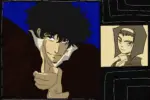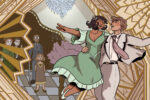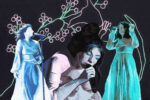Archy Marshall, better known as King Krule, released his third full-length work “the OOZ” on October 13. Marshall, who has gained the most attention as King Krule, has gone by the monikers Zoo Kid, DJ JD Sports, Pimp Shrimp and a few others. Despite a number of stage names, which could imply proliferating albums and EPs, Marshall has only two other full-length albums: “6 Feet Beneath the Moon” as King Krule and “A New Place 2 Drown” as Archy Marshall.
“The OOZ” is more clearly related to Marshall’s other release as King Krule. Where “A New Place 2 Drown” was beat-driven and guitar-absent, “The OOZ” relies more on melody and instrument—a switch from hip-hop convention to jazz. Compared to “6 Feet Beneath the Moon,” Marshall’s newest album is distinctly more ambient and spacious. Long stretches of the album are barren and dim, characterized by a permeating, lo-fi lushness.
Marshall’s talents as a producer are most evident in the seamless integration of each style. Humming synths are countered by rich bellows of brass. On “Cadet Limbo,” a jilting piano skitters up and down, raising goosebumps like rubbing styrofoam. Slightly off-pitch guitar pulls everything in, rooting the album in a world of sedated nausea. Chords seem to progress in the wrong direction, but Marshall always reveals a melody you’ve never heard before. It’s a major feat in today’s music market.
“The OOZ” is not an album that makes itself obvious. Marshall constantly hides himself, dodging behind swollen, cloudy guitar and beats, where he occasionally rises to the top to sing some distant, painful memory. “The OOZ” has the same beguiling simplicity as Portishead’s “Dummy.” You can leave them playing in the background, but once you key in to listen, you discover deep, dark, painful truths you would rather have not faced—lounge music for suicide.
The opening track, “Biscuit Town” starts with a turning sound, like a washing machine, before the melodies led by guitar and piano jump in. The lines between the two instruments blur completely, as do the boundaries of the drone that starts with organic strings morphs into a metallic whine. These subtle, nuanced tidbits that hide in the track are strong elements of production that show Marshall’s abilities across multiple genres. At times, the album sounds like textbook trip-hop, but then flairs; traditions of jazz performance come in, as do elements of surf rock and hard rock.
[su_youtube url=”https://www.youtube.com/watch?v=kpkr79srKTE”]
Through Marshall’s thick South London accent, the despair and spaciousness of “The OOZ” shines through, too. Much of the album takes place in a landscape of urban decay and garbage, sung in Marshall’s deepest register. “Biscuit Town” references a neighborhood in South London, where “I seem to sink lower.” Each verse chronicles a barren, empty scene in the life of urban youth, struggling with drugs, love and poverty. It’s as if the chimney sweeps or the paperboy of decades ago grew up in today’s climate.
Many of the tracks on “The OOZ” are without chorus, preferring instead to flow from verse into verse. Against a background of other artists, like Mac Demarco or Frank Ocean, King Krule stands out as an artist whose songwriting differs immensely. Popular music usually never strays far from a refrain or anthemic shout, but Marshall eschews the format to create series of sprawling tracks that have no discernible path until completion. Since nothing is repeated, a first listen of the album is incredibly demanding. Subsequent listens are required to get a feel of the world of “The OOZ.”
However, not every track off the album is so dense. “Bermondsey Bosom (Left)” and “Bermondsey Bosom (Right)” are short monologues, spoken against a medley of guitar and beats. The first version is recited in Spanish by a woman, while the other is told by an Englishman. The two speakers tell the same story of the descent of a man, “slipping into filth” and “[arising] a bloodsucker.” The pair most clearly illustrates the album’s themes of hollowness and decay, whether moral or physical, but don’t exactly lament them. The track trails off as the speakers chant “Me and young against this city of parasites / Parasite, paradise, parasite, paradise.”
Another more digestible track is “Sublunary,” situated toward the middle of the album. Marshall repeats the words “I was made for sublunary / I’m not here, sublunary,” as he attempts to obfuscate his presence on his own album once more. Disappearance, whether through instrumentals or songwriting, is a major concept of the album, often expressed through the experience of nighttime. Marshall, however, seems to be ambivalent towards whether isolation and vanishing are good.
On “The Locomotive,” Marshall calls out “I’m alone, I’m alone / In deep isolation / In the dead of night, in the dead of night / Waiting for the train.” By the final verse, Marshall is near-shouting as the track bursts for a brief moment. It stops itself again, like an engine running out of steam, before Marshall musters the strength to whisper, “We all have our evils / We’re told to just keep calm / Curled up and feeble.” Our inability to fix our own problems and selves is not a new theme explored in music, but Marshall tends to the subject with such nuance and reflection. While Marshall does languish in the pain, he does not shy from releasing them. On “Vidual,” about an unnamed “she,” he shouts, “She’s one of the people, she keeps on, as one of the people.”
In short, Marshall speaks with an unequivocal clarity that is not usually seen in young artists. At the young age of twenty-three, King Krule joins the ranks of other singer-songwriters like Lorde who have a preternatural gift for self-expression and an envy of the normalcy of the culture-at-large. While both Lorde and King Krule write about drugs, partying and modern love, their words are not meant to be taken as encouragement. Through participation and confession, King Krule and others criticize the negative aspects of our own lives and invite us to pause, ruminate and release.

















